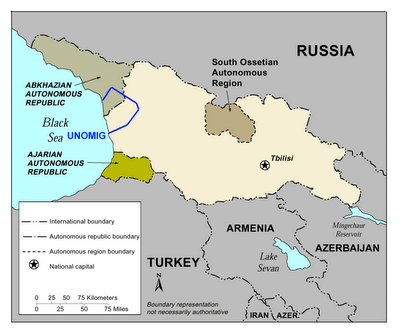 James Rogers over at European Geostrategy has an interesting post up about naval supremacy and power projection. Rogers covers a lot of ground - quoting from a BBC documentary about the Royal Navy, he expounds on the differences between naval and maritime powers, the kinds of dominion the exercise and their tendencies toward democratic or authoritarian rule - and then suggests that the E.U., having reached the limits of its geographically contiguous expansion, ought to focus on rebuilding a blue water navy capable of protecting European interests and nimbly projecting power around the globe. Rogers muses on some interesting political relationships, but I take some issue with several parts of the piece. First off, his analysis of early modern states ignores quite a few potential counter-arguments:
James Rogers over at European Geostrategy has an interesting post up about naval supremacy and power projection. Rogers covers a lot of ground - quoting from a BBC documentary about the Royal Navy, he expounds on the differences between naval and maritime powers, the kinds of dominion the exercise and their tendencies toward democratic or authoritarian rule - and then suggests that the E.U., having reached the limits of its geographically contiguous expansion, ought to focus on rebuilding a blue water navy capable of protecting European interests and nimbly projecting power around the globe. Rogers muses on some interesting political relationships, but I take some issue with several parts of the piece. First off, his analysis of early modern states ignores quite a few potential counter-arguments:
...maritime powers tend towards commerce and industry, and adopt a very light and versatile – but aggressive and expansionist – military footprint. They can draw off their financial resources during times of conflict and harness them for their geopolitical purposes, enabling them to overwhelm any opponent (who is often stronger) and bring his designs to nought. And this maritime predilection also tends towards constitutional government and democracy, in turn fostering a high degree of technological innovation and dynamism. Land powers, on the other hand, tend towards centralised government and authoritarian control. To defend their territorial holdings, they must maintain a large army rather than a navy, and use it defensively to hold on to what they have got. The sheer cost of this endeavour means that it has been – historically – an enormous burden on the economy and on the State. It also tends to hold back innovation and economic productivity.
Lots to unpack there. First off, though Continental powers went through an absolutist phase during the seventeenth and eighteenth centuries that never really caught on in Britain, scholars of democratization would probably call Rogers' (the BBC's?) story oversimplified. For example, following Charles Tilly's narrative of state building, one could easily argue that the greater resources required by continental states would increase demand for democratization in order to get people to acquiesce to a more extractive regime. Or it may be that the "maritime/land" distinction has very little to do with political freedom either way, and that the British experience was the result of path dependence or historical contingency. Certainly the early United States, which until the late nineteenth century had more of the characteristics of a land power than of a maritime one, managed to sustain comparatively democratic institutions.
As for large armies "[holding] back innovation and economic productivity," while I'm sure a case could be made for that conclusion, it's worth remembering how many innovations have come about because of state-led investment in military technology.
Moving off such historically-interesting tangents, we come to the meat of Rogers' post, where he argues for the creation of a strong E.U. navy:
Europeans must now invoke their maritime geography once again and look beyond Europe to concentrate on the wider world. The European Union needs to form an immensely powerful navy, which can be used to circulate maritime power around the Mediterranean Sea, the Red Sea, the Black Sea, Africa’s Atlantic seaboard, and particularly the Indian Ocean. It is in these regions where future European Union military operations will take place, and it is these regions from where the greatest threats to European security are already beginning to come. This naval force would need a chain of naval stations to link together a durable maritime order, enabling European power to be projected rapidly into potential trouble spots, and to exert a calming influence over potential belligerents. This maritime posture should accelerate European commercial activity, enabling the continent to retain democratic government, while stimulating an outward-looking approach to world affairs, an outlook Europeans must sustain if they are to remain a major economic power.
There are two serious problems with this argument. First, Rogers puts the cart way before the horse. He treats the E.U. like a state with a unified population, clear international interests, and the institutional capacity to represent the former and pursue the latter. Europe may someday reach that point, but it hasn't yet. It remains a muddled, fuzzy, at times self-contradictory organization with overlapping, multi-tiered spheres of authority and attenuated democratic legitimacy. To expect "Europe" to behave like a nineteenth century nation state capable of executing the kind of coherent strategy of gunboat diplomacy that Rogers advocates gives too much credit to Brussels, at least for the moment.
Second, to the extent that one can consider the E.U. to be an empire in a meaningful sense (I hear the phrase "neo-medieval" thrown around a lot), Rogers fundamentally misreads the means by which the E.U. has historically projected power. While it is true that E.U. institutional expansion has generally followed the slow, geographically-delimited pattern of traditional land empires, the means by which it has achieved this expansion are different. Military prowess played almost no role. Over the past few decades, the core states of the E.U. have enticed their neighbors to abandon key elements of their sovereignty in exchange for economic security and access to capital and markets. No doubt in the case of Eastern Europe, where memories of Soviet domination run deep, the prospect of "locking in" an alliance with the West made the move easier, but for the most part, E.U. expansion - both in terms of formal institutional reach and informal geopolitical influence - has been the result of a masterful leveraging of soft power.
The question for Rogers is this: what would the E.U. really
gain from a major navy? The Royal Navy of the nineteenth and early twentieth centuries, and the U.S. Navy that replaced it in its hegemonic role, used gunboat diplomacy to keep the world on board with contemporary geoeconomic regimes. The U.S. Navy still does that, and unless European planners envision the global economy reverting to neo-colonial mercantilism any time soon, for Europe to rebuild a massive blue water navy would be redundant and wasteful, all the more so since Europe doesn't have the political institutions to effectively use it as an instrument of power.
I doubt we'll be seeing meaningful movement in this direction any time soon.
Update: James Rogers has a great response in the comments section where he defends and fleshes out some of his arguments. Definitely worth checking out.
 Yglesias has a quick post pointing out some ridiculous comments made by James Inhofe about all the terrible things that will happen if we move GITMO detainees to facilities in the United States. Putting aside the dumb (if quite pernicious) semantic debate about trying to define torture up (down?) so that we can torture people without "torturing" people, the money quote from Inhofe is really in the second block:
Yglesias has a quick post pointing out some ridiculous comments made by James Inhofe about all the terrible things that will happen if we move GITMO detainees to facilities in the United States. Putting aside the dumb (if quite pernicious) semantic debate about trying to define torture up (down?) so that we can torture people without "torturing" people, the money quote from Inhofe is really in the second block:














